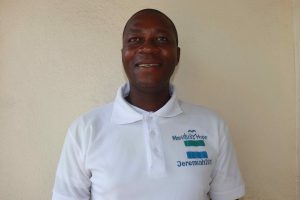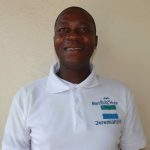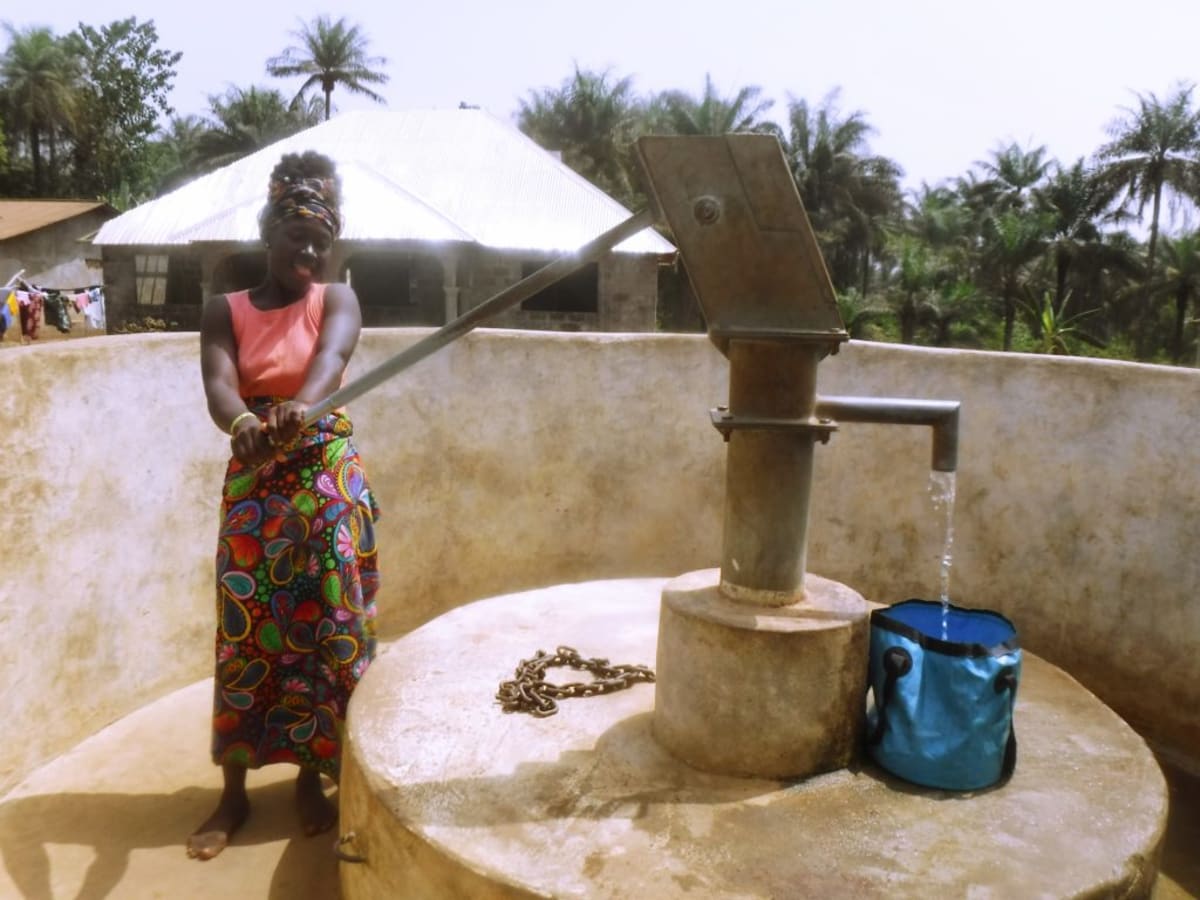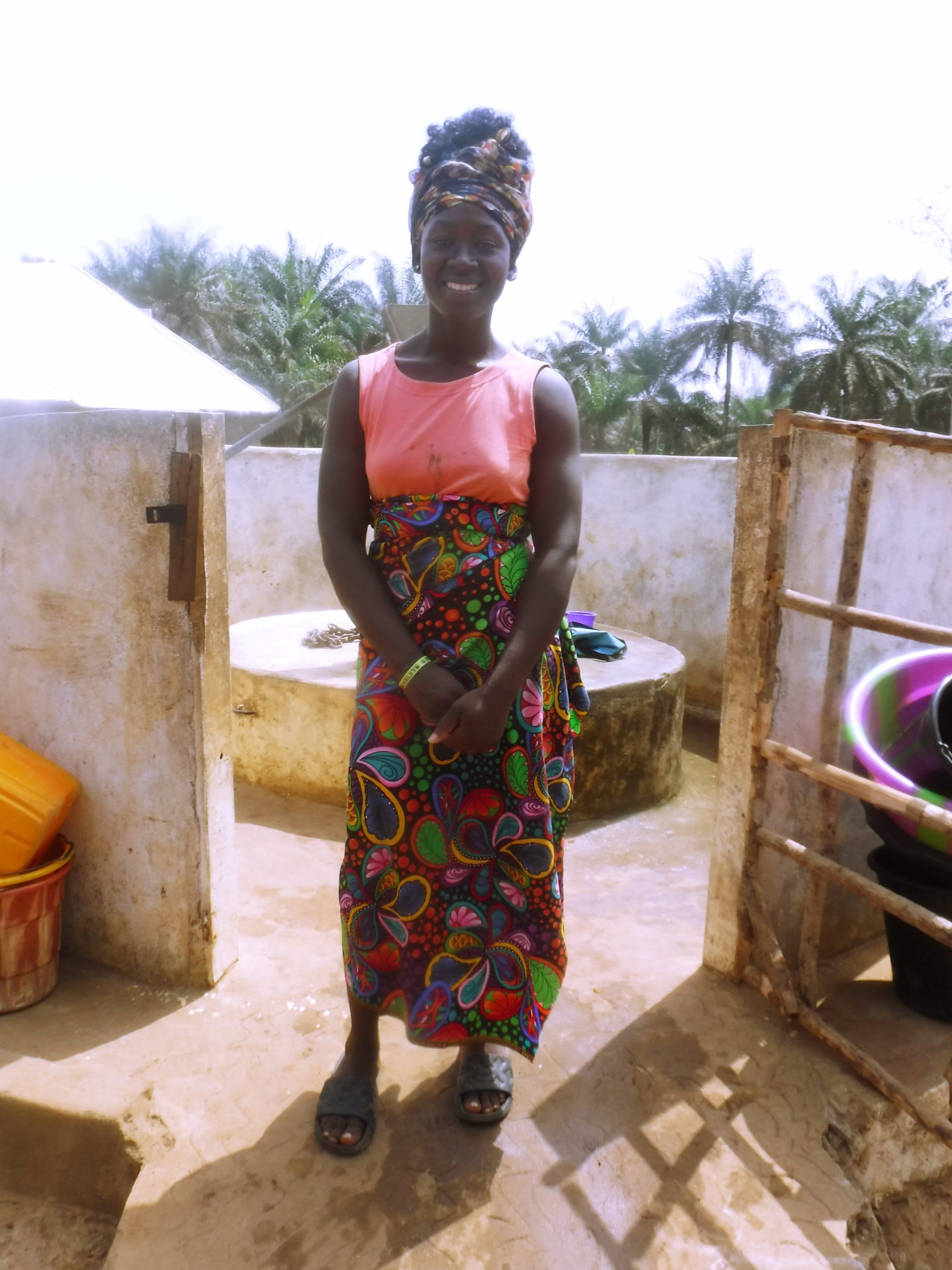May, 2022: Petifu Junction Community Well Rehabilitation Complete!
We are excited to share that a safe, reliable water point at Petifu Junction in Sierra Leone is now providing clean water to neighboring community members! We also conducted hygiene and sanitation training, which focused on healthy practices such as handwashing and using latrines.

Community members celebrate with a song.
"The new water point has [had] a profound impact in my life," said 15-year-old Fudia B. "To start with, it has helped me to have enough time to prepare for schooling. I must fetch water every day for my parents before going to school. Even though I woke up earlier to fetch water, the distance and the delay ate into my time of schooling. By the time I finished fetching water, I would have been late for school. But now, I can go to school on time."

Fudia drinks water from the newly rehabilitated well.
"I will be able to have sufficient water to wash my school uniforms on time and then have enough time to rest," Fudia added. "This will increase my time of studying, making me be outstanding in my class."
"The new water point has helped me by always making water available," said 53-year-old trader Betty Komeh. "To begin with, I found it difficult to wash my cooking items well due to the water constraints I used to face. The constraints were [the] far distance involved and the high competition to fetch water. But now, all these water challenges are over."

Betty collects water.
"The new water point will help me to prepare food on time for my household and wash my selling items (rice, cucumber, and grains)," Betty explained.
"The local rice really needs [a] lot of water for the husk to be removed. Most times, removing the husk from the rice was extremely difficult and slow because of the unavailability of water. I would spend a day to get [it] done. The longer I spent fetching water, the more I have limited time to sell in the market. At times, I even [paid] youths in this community to fetch water for me. This really hindered my trade due to the money spent. This new water point is a blessing for me because I will be able to save my money for other purposes and get things done earlier."

"This will make me healthy because the diseases I used to experience will be over," Betty continued. "The injuries and body pains I used to suffer from fetching water at a far distance [are] now over. I will no longer spend my money on medications, but use it for another purpose."

Betty, left, splashes water with Abu Bakarr Bangura from the Port Loko District Council.
We held a dedication ceremony to officially hand over the well to the community members. Several local dignitaries attended the ceremony, including representatives from the Ministry of Water Resources, the Port Loko District Council, and the Ward Council. Each official gave a short speech thanking everyone who contributed to the rehabilitation of the water project and reminding everyone to take good care of it. Then, Betty and Fudia made statements on their community's behalf. The ceremony concluded with celebration, singing, and dancing.
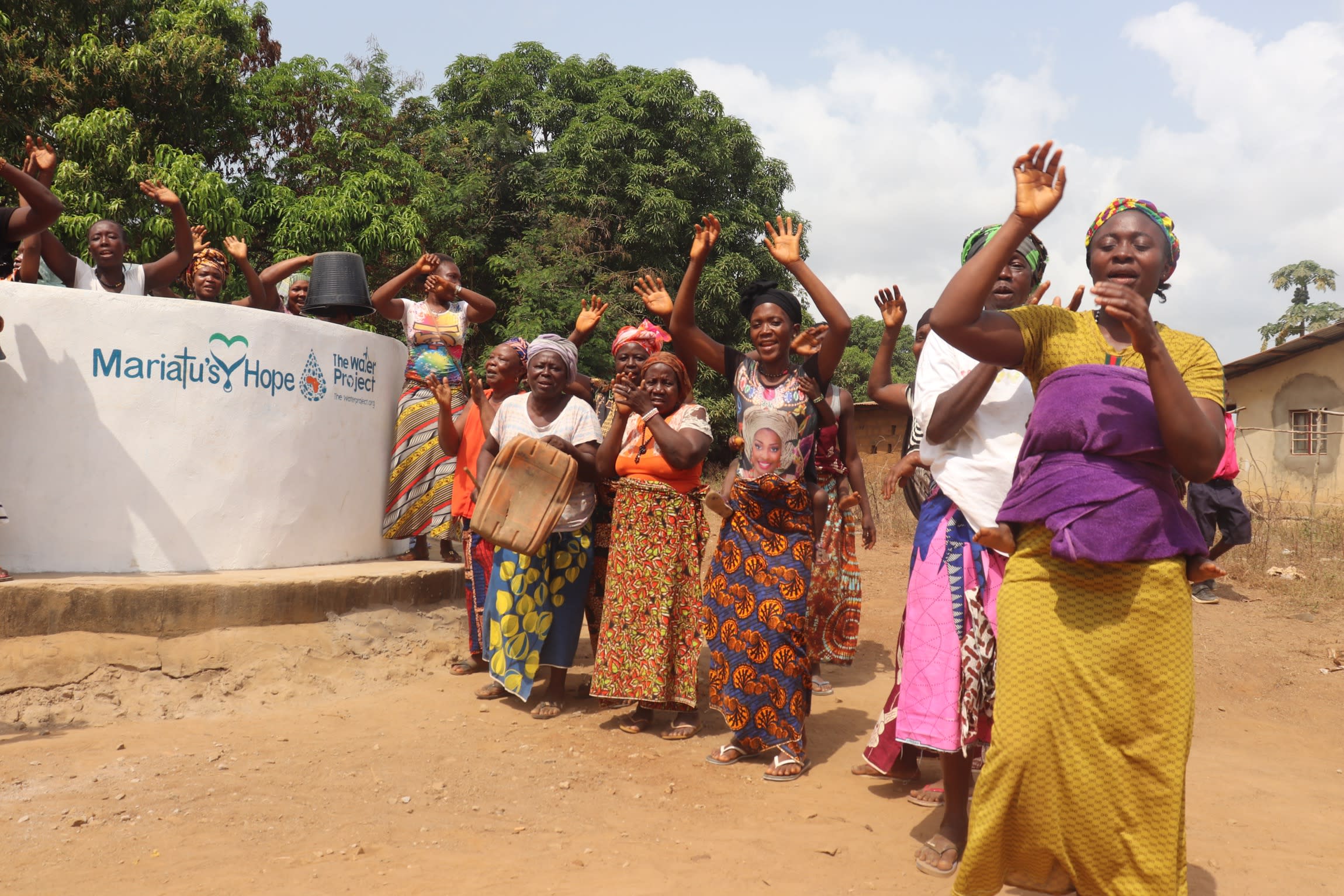
Clean Water Restored
The drill team arrived the day before beginning work. They set up camp and unpacked all their tools and supplies to prepare for drilling the next day. The community provided space for the team to store their belongings and meals for the duration of their stay. The following day, the work began.
First, we raised the tripod, the structure we use to hold and maneuver each drilling tool. Next, we measured the well's original depth. We then socketed the pipes and installed a casing.

Finally, we lined up the drill rods and started to drill! We reached a final depth of 22 meters with water at 16 meters. The hand-drill method allowed the team to install the cylinder far below the aquifer so that the community has excellent water access throughout the year.

With drilling complete, we installed screening and a filter pack to keep out debris when the water is pumped. We then cemented an iron rod to the well lining and fixed it with an iron collar at the top.
Next, we bailed the well by hand for three days and flushed it, clearing any debris generated by the drilling process. Finally, we tested the yield to ensure the well would provide clean water with minimal effort at the pump.

Community members help with the yield test.
As the project neared completion, we built a new cement platform, walls, and drainage system around the well to seal it off from surface-level contaminants. The drainage system helps to redirect runoff and spilled water to help avoid standing water at the well, which can be uncomfortable and unhygienic and a breeding ground for disease-carrying mosquitoes.
At last, we installed the stainless steel India Mk11 pump and conducted a water quality test. The test results showed that this is clean water fit for drinking!

New Knowledge
Before conducting any hygiene training, we called and visited the local water user committee to understand the community’s challenges and lack of sanitation facilities. We shared the findings from our discussions with the committee members to help them make the necessary adjustments before the training began. For example, we identified households without handwashing stations or ones that may need to repair their latrines. With this information, community members worked together to improve hygiene and sanitation at home.
After this preparatory period, we scheduled a time when members from each household using the water point could attend a multi-day hygiene and sanitation training. We then dispatched our teams to the agreed-upon location to hold the meeting.

Training topics covered included handwashing and tippy taps, good and bad hygiene habits, disease transmission and prevention, COVID-19, worms and parasites, dental hygiene, proper care of the well's pump, keeping the water clean, the cost recovery system, dish racks and clotheslines, the importance of toilets, keeping latrines clean, balanced diets, the diarrhea doll, and HIV and AIDS.
"Since I was born, I never know that we get worms from walking barefoot, or that we should change our toothbrushes after using them for three months, or that we should wash our hands with soap and water after using the toilet," said trader Emma Sillah, 35.

"This new knowledge has impacted my life by changing all my bad hygiene practices to good hygiene. With this new knowledge, I will make sure I make use of my tippy tap by washing my hands with soap and water after using the toilet, clean my environment to avoid mosquitos around, and I will make sure my children will stop taking their baths at the stream. Even to dry clothes on the ground, I never knew is bad hygiene. I [have] come to realize I was doing harm to myself. Thanks for saving our lives in this community."

The most notable topic was good and bad hygiene examples. One woman, in particular, agreed that everyone should use a clothesline, as when she used to dry her clothes on the ground, she would break out in a horrible rash and didn't know the cause.
Another topic that caused a good deal of discussion was tooth-brushing. One girl pointed at the example of the decaying teeth and said they looked like her grandmother's teeth, because her grandmother likes to chew kola nut. She resolved to ask her grandmother to stop chewing kola nut and to start brushing her teeth regularly.
When an issue arises concerning the well, community members are equipped with the necessary skills to rectify the problem and ensure the water point works appropriately. However, if the issue is beyond their capabilities, they can contact our field officers to assist them. Also, we will continue to offer them unmatchable support as a part of our ongoing monitoring and maintenance program.
Thank you for making all of this possible!

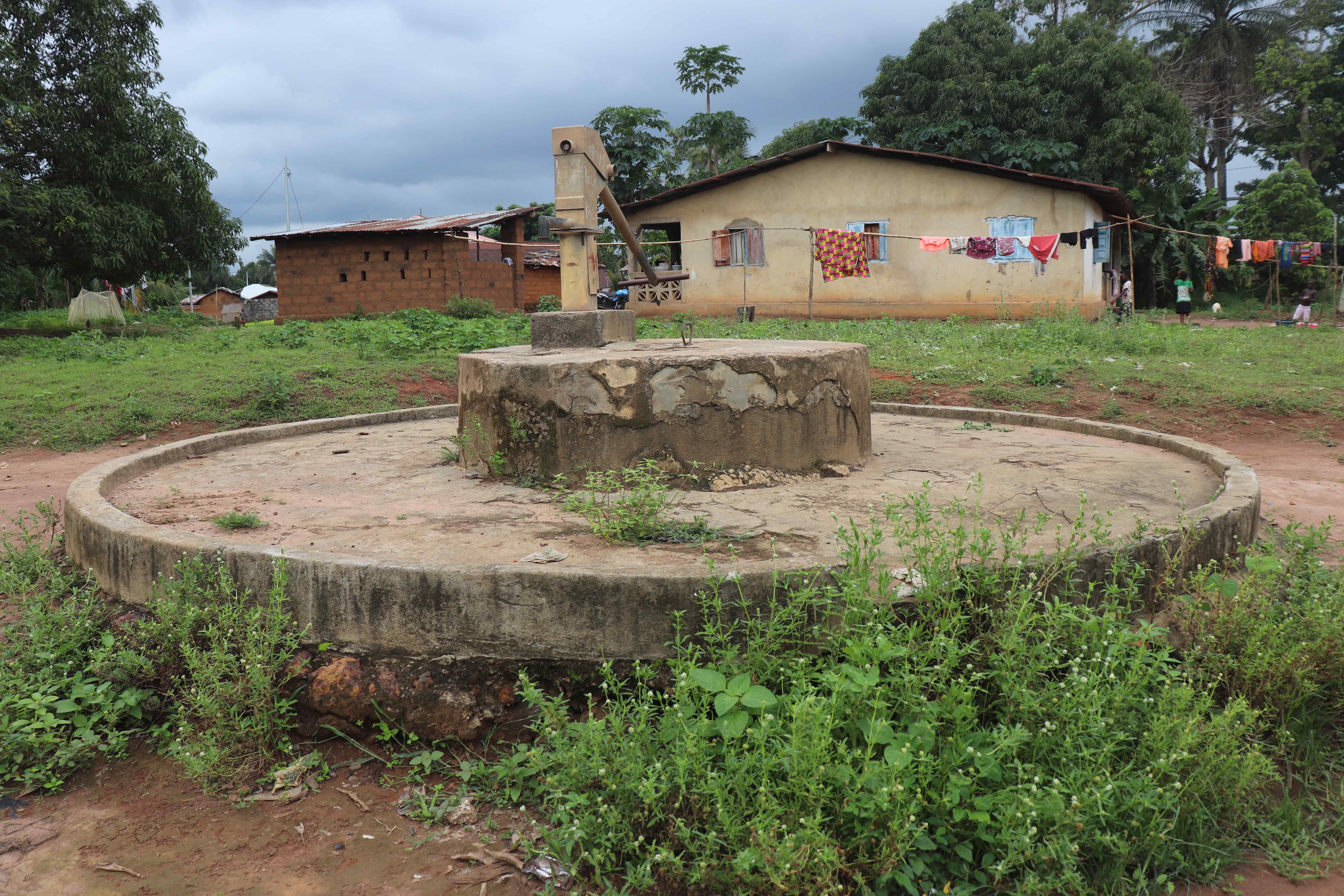

 Borehole Well and Hand Pump
Borehole Well and Hand Pump









